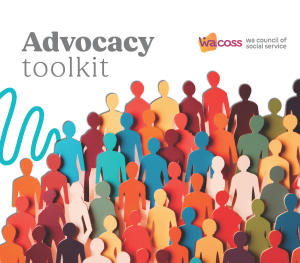WACOSS strongly opposes the repealing of responsible lending laws that weaken or remove consumer protections and calls on Parliament to vote against the Bill in its entirety.
WACOSS is deeply concerned about the implications that this Bill will have on Australians facing financial hardship or stress, particularly at a time that coincides with the Federal Government’s removal of the Coronavirus Supplement, and the conclusion of state-based rental eviction and utility disconnection moratoriums. The Government’s intention to double the protected earnings amount caps for people whose income is not predominantly from social security payments, to 20% each for payday loans and consumer leases, could result in long-lasting financial damage for low-income earners and people who are financially vulnerable.
There are many low-income workers in Western Australia, including those on traineeships, apprentices or those working in undervalued jobs, who require the vast majority of their income to pay for their day-to-day living expenses. It is well established that low-income earners disproportionately use payday loans to cover recurrent weekly living costs, such as food, rent and utility expenses due to income insufficiency.1 Research findings about borrower demographics of payday loans demonstrate the need for strong regulatory protection because ‘this demographic is also the most vulnerable in terms of becoming dependent on loans, entering into cycles of debt and lacking the financial education or means to improve their circumstances’.2 Increasing the protected earnings amount cap to 20% will undoubtedly exacerbate the financial risk of an already financially precarious cohort and may activate a perverse debt cycle: such that repayments which consume a larger portion of a low-income borrower’s salary increases the likelihood that the borrower will need to resort to another payday loan to cover cost of living expenses incurred before their next salary date. Continuous borrowing has been demonstrated to worsen the financial wellbeing of low- income borrowers. WACOSS calls on Parliament to vote against the Bill to prevent and limit ongoing damage to people who are financially vulnerable.
In addition, the devastating impact of the coronavirus pandemic on employment and job security exposed how deeply and broadly financial precarity can affect not only low-income workers in Australia, but a larger portion of the population. The economic impacts of COVID-19 have resulted in a significant number of Australians who have never experienced hardship in the past now experiencing financial vulnerability, hardship and bill stress. Those experiencing “emerging hardship”3 are in a vastly different position than individuals or families who face longer-term hardship and entrenched disadvantage. A considerable number of Australians experiencing emerging hardship are over-leveraged and are more likely to take out loans than those experiencing long-term hardship.4 Compared to other mortgage holders, those experiencing emerging hardship were more likely to defer their mortgage repayments during the six-month COVID loan deferral period5, likely indicating an inability to pay due to the financial impacts of COVID-19. Those seeking mortgage payment relief also have relatively high outstanding mortgage balances (which have now accrued additional interest and fees),6 and are over-leveraged compared to other mortgage holders placing them at increased risk of financial insecurity and debt.
Experiencing hardship for the first time brings more than just financial challenges and stress. Like many other Australians, this cohort is experiencing a shockwave of change in their lives and the long- lasting impacts of sudden disruptions to financial stability, employment, secure housing, relationships and social connections. These cumulative impacts are demonstrably leading to negative mental health and wellbeing and family relationship issues for many Australians.7 Indeed, it has been widely documented that rates of family violence and economic abuse have risen sharply during the COVID-19 pandemic.8 This strongly suggests that lenders need to take a more responsible and proactive role in assessing and accommodating the material, social and wellbeing challenges presented by COVID-19, and how they assess the post-COVID-19 borrowing capacity and affordability for those who experienced, or continue to experience, emerging hardship. Under the
proposed Bill, however, the overarching obligation for loans to be ‘not unsuitable’ for a borrower will be removed, as will other important assessment requirements for lenders and brokers, including affordability assessments for credit card issuance by banks as well as assessments that may help identify red flags for financial abuse. Taken together, the removal of these vital consumer protections creates more risk of people being provided unsuitable and unaffordable loans and potentially experiencing financial abuse.
Additionally, should consumers be provided with unsuitable and unaffordable loans, the Bill further reduces consumer protection in two mutually reinforcing ways: 1) by removing civil and criminal penalties for irresponsible lending by a credit licensee of a credit product of more than $2,000, and
2) by removing consumers’ right to take legal action for compensation for a breach of responsible lending standards. These changes reduce the likelihood that lenders will face court penalties for lending misconduct by removing disincentives for irresponsible lending practices while limiting opportunities for redress for borrowers.
Suboptimal lending practices, combined with selling and purchasing decisions driven by emotional and financial stress, will likely increase the number of highly indebted Australian households. Over- indebtedness has a range of significant short- and long-term impacts on both households and the economy, ranging from households needing to forgo essential expenses such as groceries, medicine, education or heating, to family breakdowns and subsequent impacts on child development, to increased risk of macroeconomic instability and future financial crises.9
We at WACOSS strongly believe that the removal of responsible lending obligations will result in a debt disaster that we simply are not prepared for. The timing of this change, in the midst of community recovery from the major economic shock caused by COVID-19 is particularly poor, and likely to send the wrong messages to those who are financially vulnerable and to lenders. Further, this will place even more strain on Australia’s community services already operating in an environment of converging crises and constraints as they seek to respond to and recover from the impacts of COVID-19, and the bushfire crisis, across communities. We urge all Parliamentarians to vote against the Bill.
1 Ali, P., McRae, C. H. and Ramsay, I. (2013) “The Politics of Payday Lending Regulation in Australia”, Monash University Law Review, 39(2) pp. 412-451. Available at SSRN: https://ssrn.com/abstract=2402514
2 Banks, M., Marston, G., Karger H., and Russell, R. (2012) “‘Caught Short: Exploring the Role of Small, Short- Term Loans in the Lives of Australians”, Final Report, Social Policy Unit, University of Queensland. Available at: http://mams.rmit.edu.au/w5dddp5yn6jl.pdf
3 Core Data Research (2020) “How to recognise the new face of financial hardship”, Online article. Available at: https://www.coredata.com.au/blog/how-to-recognise-the-new-face-of-financial-hardship/
4 Core Data Research (2020). As above.
5 Core Data Research (2020). As above.
6 Equifax (2020) “The COVID State Lockdown and Mortgage Deferral Correlation”, Online Article. Available at: https://www.equifax.com.au/knowledge-hub/news-and-media/covid-state-lockdown-and-mortgage-deferral- correlation
7 Kaleveld, L., Bock, C., Maycock-Sayce R. (2020) “COVID-19 and Mental Health: CSI Response), Centre for Social Impact Online Report. Available at: https://www.csi.edu.au/media/uploads/csi_fact_sheet_covid_and_mental_health.pdf
8 Boxall, H., Morgan, A., and Brown, R. (2020) “The prevalence of domestic violence among women during the COVID-19 pandemic”, Australian Institute of Criminology, Available at: https://www.aic.gov.au/publications/sb/sb28




